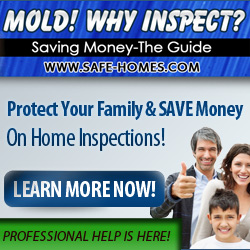Mold Inspection
The term “toxic mold” is not accurate. While certain molds are toxigenic, meaning they can produce toxins (specifically mycotoxins), the molds themselves are not toxic, or poisonous. Hazards presented by molds that may produce mycotoxins should be considered the same as other common molds which can grow in your house. There is always a little mold everywhere – in the air and on many surfaces. There are very few reports that toxigenic molds found inside homes can cause unique or rare health conditions such as pulmonary hemorrhage or memory loss. These case reports are rare, and a causal link between the presence of the toxigenic mold and these conditions has not been proven.
In 2004 the Institute of Medicine found there was sufficient evidence to link indoor exposure to mold with upper respiratory tract symptoms, cough, and wheeze in otherwise healthy people; with asthma symptoms in people with asthma; and with hypersensitivity pneumonitis in individuals susceptible to that immune-mediated condition. The IOM also found limited or suggestive evidence linking indoor mold exposure and respiratory illness in otherwise healthy children. In 2009, the World Health Organization issued additional guidance, the WHO Guidelines for Indoor Air Quality: Dampness and Mould. Other recent studies have suggested a potential link of early mold exposure to development of
asthma in some children, particularly among children who may be genetically susceptible to asthma development, and that selected interventions that improve housing conditions can reduce morbidity from asthma and respiratory allergies, but more research is needed in this regard.
Mold Inspection
A common-sense approach should be used for any mold contamination existing inside buildings and homes. The common health concerns from molds include hay fever-like allergic symptoms. Certain individuals with chronic respiratory disease (chronic obstructive pulmonary disorder, asthma) may experience difficulty breathing. Individuals with immune suppression may be at increased risk for infection from molds. If you or your family members have these conditions, a qualified medical clinician should be consulted for diagnosis and treatment. For the most part, one should take routine measures to prevent mold growth in the home. Read More
Mold Inspection
Source: CDC.gov





